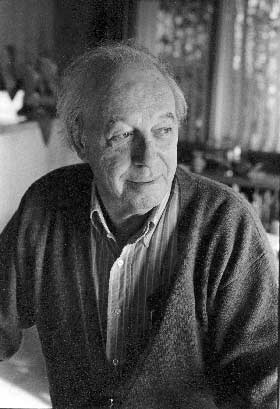UC Berkeley Press Release
Herbert McClosky, pioneer in political behavior research, dies at 89
BERKELEY – Herbert McClosky, a University of California, Berkeley, political science professor emeritus who used survey instruments to perform pioneering research into political beliefs, attitudes and ideologies, died Monday (March 13) of pneumonia and complications of Parkinson's disease. He was 89 years old.
The Berkeley resident died at Summit Medical Center in Oakland.
 Herbert McClosky |
McClosky, who joined the UC Berkeley faculty in 1960 and taught there for almost three decades, was a major force in the work of the campus's Survey Research Center and the establishment of "political behavior" as a graduate teaching field within the campus's Charles and Louise Travers Department of Political Science.
"His work helped transform political science and was unique in seamlessly integrating important normative questions with rigorous empirical research in elegant prose," said UC Berkeley political science professor Jack Citrin, who received his doctorate at UC Berkeley as a student of McClosky's. "He taught and inspired me and others and defined the trajectory of current research on issues ranging from the nature and influence of political ideologies, to democratic commitment, and partisan polarization."
McClosky's research included two major books, "Dimensions of Tolerance: What Americans Believe About Civil Liberties" (with Alida Brill, 1983), and "The American Ethos: Public Attitudes Toward Capitalism and Democracy" (with John Zaller, 1984), as well as numerous articles written over the last half-century that are still cited and relied upon by contemporary researchers. One of these articles, "Consensus and Ideology in American Politics," (1964) was recently identified as the 13th most cited American Political Science Review article in the last 100 years. McClosky also wrote a major text on the Soviet Union, "The Soviet Dictatorship" (with J. Turner, 1960).
According to Dennis Chong, a Northwestern University political science professor and one of McClosky's former doctoral students, "Herb McClosky's survey research on the social psychological foundations of democratic institutions helped transform the theory and methodology of modern political science. He illuminated the big imponderables of society, such as intolerance, political alienation, conformity, and ideological conflict, by showing how these phenomena could be explained - at least partly - by systematic social processes."
McClosky was born in a working-class area of Newark, New Jersey, on Sept. 18, 1916. Neither of his parents was educated beyond the beginnings of high school. The family lived above a candy store and soda fountain where McClosky worked as a little boy, operating the fountain from a perch atop a wooden box, family members and colleagues said. There was no indoor bathroom, and the children of the family slept in the kitchen.
No amount of after-school work he undertook to shore up his family's finances, even after his father's health faltered, diminished the high quality of his intellectual performance, according to relatives.
McClosky worked his way through the then-private University of Newark (now Rutgers-Newark), studying economic history, political philosophy and comparative government. He received his bachelor's degree from the university in 1940, graduating Phi Beta Kappa.
He then repeated his academic success in graduate work at the University of Minnesota, earning a doctorate degree in 1946. As a very junior member of the University of Minnesota faculty, his teaching in the humanities program and in political science was widely admired for its vitality and range, according to colleagues. At Minnesota, McClosky made close life-long friendships with the novelists Saul Bellow and Isaac Rosenfeld, according to McClosky's wife, Mildred. She said he also joined the brain trust that the young Mayor Hubert Humphrey gathered about him in the course of consolidating the Minnesota Democratic and Farmer-Labor parties and while seeking to rid the municipal government of Minneapolis of corruption, anti-Semitism and racial prejudice.
While at Minnesota, McClosky gravitated toward the world-famous cluster of social psychologists that then taught on the Minneapolis campus - especially Paul Meehl, then-chair of the university's psychology department, relatives said. And, with the help of a multi-year grant, McClosky supplemented his doctoral education with post-doctoral training in social psychology, psychometrics and survey research.
From the mid-1950s onward, a hallmark of McClosky's work was the design and application of elaborate survey instruments to the study of political attitudes and their foundations in core ideological beliefs, according to political science colleagues. After an immensely productive two decades at the University of Minnesota, McClosky moved to UC Berkeley where he set up his influential program of teaching and research in behavioral political science.
During his academic career McClosky was elected to the American Academy of Arts and Sciences, served as vice president of the American Political Science Association and worked with or led numerous research foundations and councils.
Upon his retirement from UC Berkeley in 1987, campus officials awarded him the Berkeley Citation for notable professional achievement and service to the university.
He is survived by his wife of 64 years, Mildred (Mitzi) of Berkeley; daughter Jane Greco of San Jose; son Dan McClosky of Oakland; brother Gerald McClosky of Eureka, Calif.; and five grandchildren, Karine and David McClosky of Berkeley, Marc Weber of San Francisco, and Jonathan and Michael Greco of San Jose.
A memorial service for McClosky will be held on April 16, from 3-5 p.m. in the Great Hall at UC Berkeley's Faculty Club.

